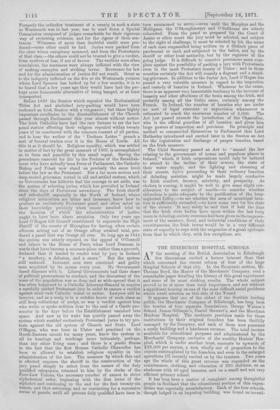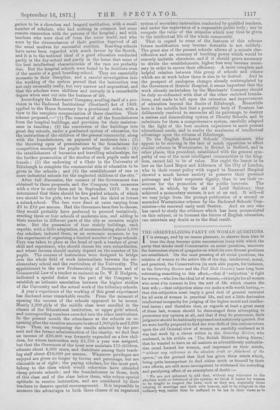THE EDINBURGH HOSPITAL SCHOOLS.
AT the meeting of the British Association in Edinburgh few discussions excited a keener interest than that which concerned the recent reform of four of the large Hospital Schools of that city. In the Economic section, Mr. Thomas Boyd, the Master of the Merchants' Company, read a remarkable paper detailing the history of this great experiment and some of its must striking results. The whole subject proved to be of more than local importance, and not without a significant bearing on one of the most difficult social problems which await solution on this side of the Tweed.
It appears that one of the oldest of the Scottish leading guilds, the Merchants' Company of Edinburgh, has long been the trustee of four separate foundations, George Watson's School, James Gillespie's, Daniel Stewart's, and the Merchant Maidens' Hospital, The moderate provision made for these institutions by their original founders has been thriftily managed by the Company, and each of them now possesses a costly building and a handsome revenue. The total income available for educational purposes and administered by the Merchants' Company, exclusive of the wealthy Heriots' Hos- pital, which is under another trust, amounts to upwards of £20,000 per annum, a sum wholly out of proportion to the objects contemplated by the founders, and even to the enlarged operations till recently carried on by the trustees. Two years ago the whole of this great revenue was expended on the maintenance, clothing, and education of 230 children, on an almhouse with 40 aged inmates, and on a small and not very efficient primary school. It has long been a matter of complaint among thoughtful people in Scotland that the educational portion of this expen- diture was especially unsatisfactory. Each of the four schools, though lodged in an imposing building, was found on investi.
gation to be a cheerless and languid institution, with a small number of scholars, who had nothing in common but some remote connection with the patrons of the hospital ; and with teachers who were shut off from the outer world, and who were by the circumstances of their position deprived of all the usual motives for successful exertion, Boarding-schools have never been regarded with much favour by the Scotch, and it is to the national ideal of a good education conducted partly in the day-school and partly in the home that some of the best intellectual characteristics of the race are probably due. But the hospital schools were found to be destitute even of the merits of a good boarding-school. They are essentially monastic in their discipline, and a careful investigation into the working of the system proved that the instruction was not only unusually costly, but very narrow and unpractical, and that the scholars were shiftless and unready in a remarkable degree when sent out into the business of life.
Accordingly the Merchants' Company, availing itself of a pro- vision in the Endowed Institutions' (Scotland) Act of 1869, applied to the Home Secretary for a provisional order, with a view to the complete reorganization of these charities. Their scheme proposed,—" (1) The removal of all the foundationers from the hospital buildings, and provision for their mainten- ance in families ; (2) the conversion of the buildings into great day schools, under a graduated, system of education, for the instruction of the children of the general community, along with the foundationers, on payment of moderate fees ; (3) the throwing open of presentations to the foundations for competition amongst the pupils attending the schools ; (4) the establishment of bursaries and travelling scholarships, for the further prosecution of the studies of such pupils male and female ; (5) the endowing of a Chair in the University of Edinburgh to complete the commercial side of education to be given in the schools ; and (6) the establishment of one or more industrial schools for the neglected children of the city."
After full discussion, the consent of the Government was obtained to these proposals, and the Company took measures with a view to carry them out in September, 1870. It was determined that there should be five graded schools, of which two should be for girls, two for boys, and the third or lowest a mixed„ school. The fees were fixed at rates varying from £1 to £10 per annum. Had the Governors been free to choose, they would probably have preferred to proceed tentatively, erecting three or four schools of moderate size, and adding to their number in different parts of the city as occasion might arise. But the possession of four stately buildings, each capable, with a little adaptation, of accommodating about 1,000 day scholars, induced them, as an economic measure, to try the experiment of organizing a limited number of large schools. Care was taken to place at the head of each a teacher of great skill and experience, who should choose his own subordinates, and whose income should mainly depend on the number of his pupils. The courses of instruction were designed to bridge over the whole field of work intermediate between the ele- elementary school and the curriculum of the University. The appointment to the new Professorship of Economics and of Commercial Law of a teacher so eminent as Dr. W. B. Hodgson, indicated a special desire on the part of the Company to establish an intimate association between the higher studies of the University and the actual work of the tributary schools. A year's experience of the working of this great experiment has disclosed some remarkable results. From the moment of opening the success of the schools appeared to be secure. Nearly 1,200 girls of the middle class were enrolled in the classes of the Educational institution, or upper girls' school, and corresponding numbers crowded into the other institutions. In the present month the attendance at the schools on re- opening after the vacation amounts to about 1,900 girls and 2,200 boys. Thus, on comparing the results attained by the pre- sent and the former administration of the charity, we find that an income of £20,800 was formerly expended on a few chil- dren, for whose instruction only £1,736 a year was assigned, but that the Governors of the trust now maintain 175 children, educate about 4,000 more, and distribute among their teach- ing staff about £18,000 per annum. Whatever privileges are enjoyed are given no longer by favour and patronage, but are claimable as of right ; the paying scholars, for the most part, belong to the class which would otherwise have attended cheap private schools ; and the foundationers to those, both of this class and of the class below them, who evince special aptitude to receive instruction, and are considered by their teachers to deserve special encouragement. It is impossible to measure the advantages to both these classes of an organized system of secondary instruction conducted by qualified teachers, and under the supervision of a responsible public body ; nor to compute the value of the stimulus which may thus be given to the intellectual life of the whole community.
That in regard to some of the features of this scheme future modification may become desirable is not unlikely. The great size of the present schools allows of a minute clas- sification and an economy of teaching power which would be scarcely imitable elsewhere, and if it should prove necessary to divide the establishments, higher fees may become neces- sary in order to secure their efficiency. A more complete and helpful relation between this group of schools and others which are at work below them is also to be desired. And in the prospect of analogous changes already contemplated by the Governors of Heriots' Hospital, it seems important that the work already undertaken by the Merchants' Company should be duly co-ordinated with that of the other endowed founda- tions, and made to tell upon the extension and improvement of education beyond the limits of Edinburgh. Meanwhile here is the notable fact that a powerful body of Trustees has deliberately resolved to surrender all its patronage, to destroy a useless and demoralizing system of Charity Schools, and to substitute for them a comprehensive system, carefully adapted in the light of the best modern experience to meet present educational needs, and to confer the maximum of intellectual advantage upon the citizens of Edinburgh. To the English Endowed Schools' Commissioners, who appear to be striving in the face of much opposition to effect similar reforms in Westminster, in Bristol, in Bedford, and in other places, this precedent, established with the general sym- pathy of one of the most intelligent communities in the king- dom, cannot fail to be of value. Nor ought the lesson to be lost on the Lord Mayor and Aldermen of the City of London, who in their recent policy with regard to Emanuel Hospital showed a much keener anxiety to preserve their personal patronage and their corporate dignity, than to use their re- sources for the promotion of the public interests. The
contest, in which, by the aid of Lord Salisbury, they achieved a momentary success, is not at an end. It will—if we may judge from the prompt publication of a second or amended Westminster scheme by the Endowed Schools' Com--
mission—be renewed early next Session. And no one who has cared to study the evidence which has been accumulated' on this subject, or to forecast the future of English education, can entertain any doubt as to the final result.































 Previous page
Previous page